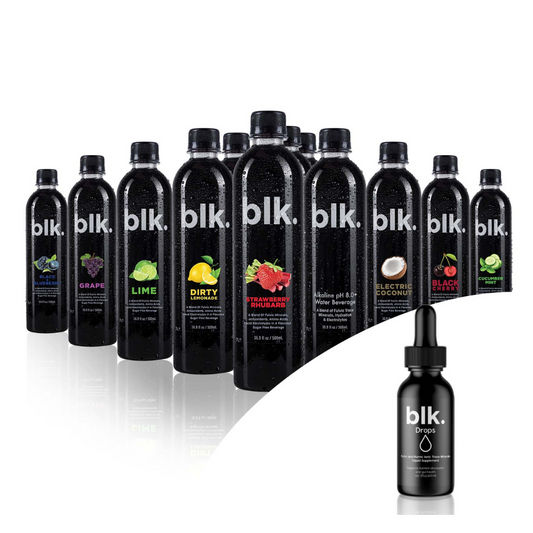
Whey Protein Hydrolysate and Blood Sugar Control
This Article Seeks to Answer the following:
- What is whey protein hydrolysate?
- How does it control blood sugar?
- How does it affect people with diabetes?
- How does it compare to other types of protein?
Are you looking for a supplement to power through your fitness routine while at the same time regulating your blood sugar levels? Whey protein hydrolysate has got you covered. Research provides that whey protein helps supply the body with the necessary protein for muscle building and repair and regulates blood sugar levels. This article will discuss protein hydrolysate and its role in blood sugar regulation.
What is Whey Protein Hydrolysate?
Before defining whey protein hydrolysate, let's first understand what whey protein is.
Whey protein is a protein derived from milk during the cheese-making process. When making cheese, the liquid part that is separated from the cheese is called whey. Whey is then dried and processed to make whey protein.
There are three forms of whey protein—concentrate, isolate, and hydrolysate. The difference between the three is how they are processed.
- Protein concentrate undergoes less processing to concentrate the protein content, which ranges between 40-80%.
- Protein isolate undergoes further processing of isolating the protein to purify it to more than 90% protein concentration.
- Whey protein hydrolysate undergoes another hydrolysis process, breaking the protein into smaller peptides and free amino acids using acids or enzymes. This process is done to increase the bioavailability of the protein. Basically, the protein is pre-digested so that it is easily digested and absorbed into the body.
Whey protein hydrolysate has several advantages over other protein forms. Because it is easily absorbed into the body, hydrolyzed whey protein has the effect of better muscle growth and faster recovery. It also has the potential benefit of regulating blood sugar levels. How? Let’s get into the details of how it does so.
The Science Behind Whey Protein Hydrolysate and Blood Sugar Control
Studies have found that whey protein hydrolysate has more significant insulinotropic effects than other protein forms. But what is this insulinotropic effect? It means stimulating insulin production (the hormone responsible for regulating blood sugar levels). Whey protein is rich in the amino acid leucine, which stimulates muscle building and initiates insulin secretion. When insulin detects a spike in blood sugar levels, it reduces it to normal sugar levels. By promoting insulin secretion, whey protein hydrolysate assists in regulating blood sugar levels.
Blood sugar level also rises when we eat meals high in carbohydrates. When carbohydrates are digested, they are converted into glucose, which is used as an energy source. Keep in mind that too much glucose results in rising blood sugar levels. Conversely, protein does not significantly affect blood sugar levels when digested.
During digestion, the protein is broken down into peptides and amino acids essential in muscle building and recovery. When protein is taken together with carbohydrates, it can slow down the rate at which carbohydrates are absorbed. If the carbohydrates are not absorbed, the glucose in the blood remains at normal levels.
The Impact of Whey Protein Hydrolysate on Blood Sugar Control in Individuals with Diabetes
Diabetes is a chronic condition in which the pancreas cannot produce enough insulin to regulate glucose(blood sugar). Without insulin to control sugar levels, people with diabetes risk developing life-threatening conditions like kidney failure and heart disease.
Diabetes can be managed through diet, and whey protein hydrolysate can be helpful in this regard. Some ways in which people with diabetes can benefit from whey protein hydrolysate include;
- Improved insulin sensitivity- Whey protein hydrolysate increases insulin sensitivity, improving how insulin responds to a rise in blood sugar levels. It prevents complications that would develop due to unchecked sugar levels.
- Suppression of appetite- Whey protein hydrolysate also helps people with diabetes by suppressing their appetite. When appetite is reduced, fewer calories and carbohydrates are consumed; therefore, there would be a little conversion of carbohydrates to glucose, keeping blood sugar levels low.
Other than these direct benefits, whey protein hydrolysate also helps increase muscle mass and strength that prevents developing complications related to diabetes.
The Impact of Whey Protein Hydrolysate on Blood Sugar Control in Older Adults
As people age, their immunity declines, making them more susceptible to contracting diseases like diabetes. A study conducted to determine whey protein's effect on blood sugar levels in older adults found that eating carbs and protein reduced glucose concentration. Supplementing the diet with proteins like whey may be a good strategy for preventing and managing diabetes among older adults.
Comparison Between Whey Protein Hydrolysate and Casein Protein Hydrolysate
Whey and casein are the two types of protein found in milk. So, which one is more effective in controlling blood sugar levels? Studies have shown that whey protein is superior to casein and is usually preferred in supplements.
Whey is the superior protein because it has a higher concentration of branched-chain amino acids like casein and is absorbed more rapidly in the stomach. Because whey has a higher concentration of amino acids and is absorbed faster than casein, it can trigger insulin faster which controls blood sugar levels.
Conclusion
In summary, whey casein hydrolysate helps control blood sugar levels. Research has demonstrated that when protein is taken alongside carbohydrates, it can reduce the spike in blood sugar levels when the carbohydrates are converted into glucose because proteins delay the rate of digestion absorption of the carbohydrate into the body.
It also increases insulin sensitivity, which can control the blood sugar level. The bottom line is that whey protein hydrolysate is suitable for people with diabetes; however, such people should consult their doctors before taking any whey protein hydrolysate supplements.
Frequently Asked Questions
-
What is the recommended dosage for whey protein hydrolysate for blood sugar control?
-
Can whey protein hydrolysate be used as a sole treatment for blood sugar control, or should it be used with other methods?
-
Can lactose-intolerant individuals consume whey protein hydrolysate?
-
How does the impact of whey protein hydrolysate on blood sugar control differ between men and women?




